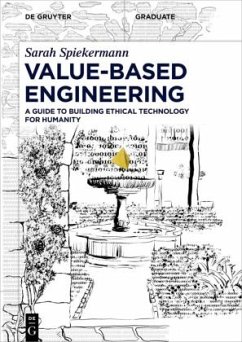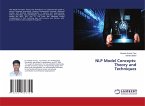In times of powerful AI systems, such as GPT, Value-based Engineering is deeply needed. It is a new transdisciplinary IT innovation- and engineering approachrespecting human values and societal consequences of IT systems as these are planned and in early evolution stages. The book tells the story of why we need technology for humanity more than ever before and what principles we should follow in building it. More concretely, it is a guide on how exactly companies should pursue their innovation efforts with an epilogue on how this is different from aspiring science fiction. The Value-based Engineering approach outlined in this book with concrete case-studies, forms and over 90 illustrations was developed and revised by over 100 experts from around the world engaged in a project called IEEE P7000 TM.
https://www.value-based-engineering.com/
https://www.youtube.com/channel/UCrLvHXQKvx17-PbWaYJzEQQ
Hinweis: Dieser Artikel kann nur an eine deutsche Lieferadresse ausgeliefert werden.
https://www.value-based-engineering.com/
https://www.youtube.com/channel/UCrLvHXQKvx17-PbWaYJzEQQ
Hinweis: Dieser Artikel kann nur an eine deutsche Lieferadresse ausgeliefert werden.
Raja Chatila (Professor, Sorbonne University, Paris)
"There is a wealth of books and publications about technology ethics, or recommendations for trustworthy AI systems. Recently, the IEEE published the "Standard Model Process for Addressing Ethical Concerns during System Design" (the IEEE Std. 7000-2021) under Sarah Spiekermann's leadership. But what are the foundations of ethical design? What are values, and what is the difference with principles? Above all, HOW to concretely develop a technological system that is aligned with humanistic values? While the European AI Act is still in the womb, Sarah Spiekermann united her knowledge, experience and talent together in this brilliant and accessible book which provides a comprehensive manual, bridging the gap between theory and practice. It will be the precious companion of every engineer and every manager, to understand how to build ethically aligned technologies, but also a resource to empower the interested citizen."
Lee Barford (Fellow at Keysight Technologies, computer scientist, theologian, Silicon Valley)
"Others have philosophized about applying ethical and technical wisdom to yield innovation that benefits humanity. This book brings together the understanding of human values, business leadership, and engineering and software processes needed to bring about ethical innovation in practice."
Lewis Gray (Software System Development Consultant, Washington)
"I sincerely believe that this book has the potential to revolutionize the systems development industry as compliant projects create attractive, ethical "canaries" in the nonethical (often unethical) "coal mine" of the systems development marketplace."
Ali Hessami (CEO of Vega Systems and former Chair of the IEEE 7000 standardization project, London)
"Autonomy and algorithmic learning are defining features of key emerging technologies with pervasive use and wide-ranging social impact. Consideration of human values in the design of these technologies is addressed in the landmark IEEE 7000:2021 standard, as the forerunner of Value Based Engineering practice. The training underpinned by this comprehensive handbook will generate requisite insights and empower technologists and principal stakeholders to incorporate, foster and where appropriate, protect stakeholder values in their technological artefacts and services. As the chair and technical editor of IEEE7000 standard, I commend this foundational training as the most insightful programme for Value Based Engineering."
(Yvonne Hofstetter, Lawyer, Professor h. c. for Digitization and Society, CEO of 21strategies, Munich)
"Sarah Spiekermann belongs to the most significant voices of our times when it comes to Value-based Engineering. Her work focuses on development and facilitation of philosophical knowledge for system engineers. Spiekermann succeeds in a unique way in bringing natural sciences and technology into a long overdue concordance with the humanities, an effort aiming to make our highly technology-focused century more humane again. Her work inspires an unusually creative realization of positive machines, which strive for more than attaining the economic value of modern technical systems. In her book "Value-based Engineering" she takes the reader by the hand and guides her through theories of values and ethics, and also uses rich imagery to introduce her to those tools which help to ensure that technical systems of the future bring ever more joy and VALUE-add in the best meaning of the word."
Konstantinos Karachalios (Managing Director of the IEEE Standards Association, New York)
"What started as an exploration of thinking on computer ethics in Sarah Spiekermann's "Ethical IT Innovation: A Value-Based System Design Approach" has now culminated in this very remarkable practical guide to build ethical technology platforms through value-based engineering. Between these two milestones resides the development of the IEEE Standard 7000, "Model Process for addressing Ethical Concerns during System Design", that was inspired and initiated by Sarah Spiekermann, and which constitutes one of the foundational elements of Sarah's new book. Beyond its inherent unique value for IT systems designers, this book is also a testimony about a passionate journey leading from high-level principles and values to concrete and pragmatic guidance and practice. Such a journey affords a very intense personal commitment in the messy waters of rules-based, collective consensus building over many years, not an evident call for a teaching academic. But a compelling one for a person with a positive vision for humanity, a love for ethics and philosophy as well as a passion for good governance of technology. We were really lucky and privileged to have joined forces with Sarah to advance toward this goal."
Paul Nemitz (Principle Advisor, European Commission, Directorate-General for Justice and Consumers, Brussels)
"Sarah Spiekerman paves the way for engineers to combine imagination, innovation and societal responsibility commensurate with their new and exponentially increasing power in the age of artificial intelligence. Individual engineers will be able to discharge their new responsibilities only if they personally engage their genuine human ability of critical reflection and deliberation with others in all stages of their work. This book will be a starting point in this endeavour which will eventually have to lead to an emancipation of engineers from the domination by profit objectives to a culture of engineers who as individuals in all their doing act as responsible citizens who contribute to ecological and social sustainability, the good functioning of democracy and the rule of law and the delivery of fundamental rights and civil liberties and who discharge this duty even in adverse circumstances and where necessary against the pressure of profit objectives of their employers or customers."
"There is a wealth of books and publications about technology ethics, or recommendations for trustworthy AI systems. Recently, the IEEE published the "Standard Model Process for Addressing Ethical Concerns during System Design" (the IEEE Std. 7000-2021) under Sarah Spiekermann's leadership. But what are the foundations of ethical design? What are values, and what is the difference with principles? Above all, HOW to concretely develop a technological system that is aligned with humanistic values? While the European AI Act is still in the womb, Sarah Spiekermann united her knowledge, experience and talent together in this brilliant and accessible book which provides a comprehensive manual, bridging the gap between theory and practice. It will be the precious companion of every engineer and every manager, to understand how to build ethically aligned technologies, but also a resource to empower the interested citizen."
Lee Barford (Fellow at Keysight Technologies, computer scientist, theologian, Silicon Valley)
"Others have philosophized about applying ethical and technical wisdom to yield innovation that benefits humanity. This book brings together the understanding of human values, business leadership, and engineering and software processes needed to bring about ethical innovation in practice."
Lewis Gray (Software System Development Consultant, Washington)
"I sincerely believe that this book has the potential to revolutionize the systems development industry as compliant projects create attractive, ethical "canaries" in the nonethical (often unethical) "coal mine" of the systems development marketplace."
Ali Hessami (CEO of Vega Systems and former Chair of the IEEE 7000 standardization project, London)
"Autonomy and algorithmic learning are defining features of key emerging technologies with pervasive use and wide-ranging social impact. Consideration of human values in the design of these technologies is addressed in the landmark IEEE 7000:2021 standard, as the forerunner of Value Based Engineering practice. The training underpinned by this comprehensive handbook will generate requisite insights and empower technologists and principal stakeholders to incorporate, foster and where appropriate, protect stakeholder values in their technological artefacts and services. As the chair and technical editor of IEEE7000 standard, I commend this foundational training as the most insightful programme for Value Based Engineering."
(Yvonne Hofstetter, Lawyer, Professor h. c. for Digitization and Society, CEO of 21strategies, Munich)
"Sarah Spiekermann belongs to the most significant voices of our times when it comes to Value-based Engineering. Her work focuses on development and facilitation of philosophical knowledge for system engineers. Spiekermann succeeds in a unique way in bringing natural sciences and technology into a long overdue concordance with the humanities, an effort aiming to make our highly technology-focused century more humane again. Her work inspires an unusually creative realization of positive machines, which strive for more than attaining the economic value of modern technical systems. In her book "Value-based Engineering" she takes the reader by the hand and guides her through theories of values and ethics, and also uses rich imagery to introduce her to those tools which help to ensure that technical systems of the future bring ever more joy and VALUE-add in the best meaning of the word."
Konstantinos Karachalios (Managing Director of the IEEE Standards Association, New York)
"What started as an exploration of thinking on computer ethics in Sarah Spiekermann's "Ethical IT Innovation: A Value-Based System Design Approach" has now culminated in this very remarkable practical guide to build ethical technology platforms through value-based engineering. Between these two milestones resides the development of the IEEE Standard 7000, "Model Process for addressing Ethical Concerns during System Design", that was inspired and initiated by Sarah Spiekermann, and which constitutes one of the foundational elements of Sarah's new book. Beyond its inherent unique value for IT systems designers, this book is also a testimony about a passionate journey leading from high-level principles and values to concrete and pragmatic guidance and practice. Such a journey affords a very intense personal commitment in the messy waters of rules-based, collective consensus building over many years, not an evident call for a teaching academic. But a compelling one for a person with a positive vision for humanity, a love for ethics and philosophy as well as a passion for good governance of technology. We were really lucky and privileged to have joined forces with Sarah to advance toward this goal."
Paul Nemitz (Principle Advisor, European Commission, Directorate-General for Justice and Consumers, Brussels)
"Sarah Spiekerman paves the way for engineers to combine imagination, innovation and societal responsibility commensurate with their new and exponentially increasing power in the age of artificial intelligence. Individual engineers will be able to discharge their new responsibilities only if they personally engage their genuine human ability of critical reflection and deliberation with others in all stages of their work. This book will be a starting point in this endeavour which will eventually have to lead to an emancipation of engineers from the domination by profit objectives to a culture of engineers who as individuals in all their doing act as responsible citizens who contribute to ecological and social sustainability, the good functioning of democracy and the rule of law and the delivery of fundamental rights and civil liberties and who discharge this duty even in adverse circumstances and where necessary against the pressure of profit objectives of their employers or customers."








